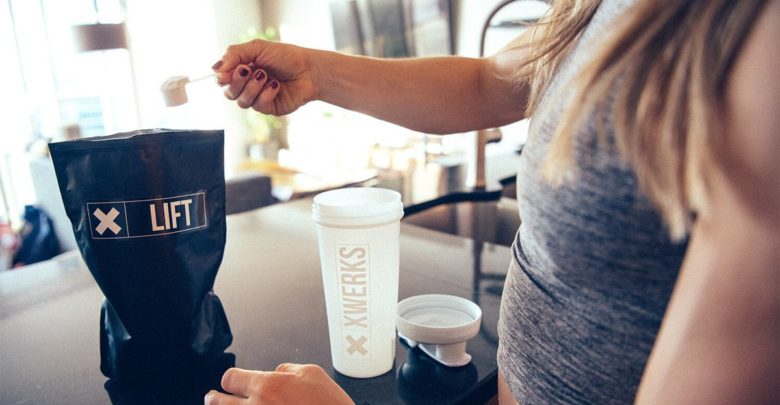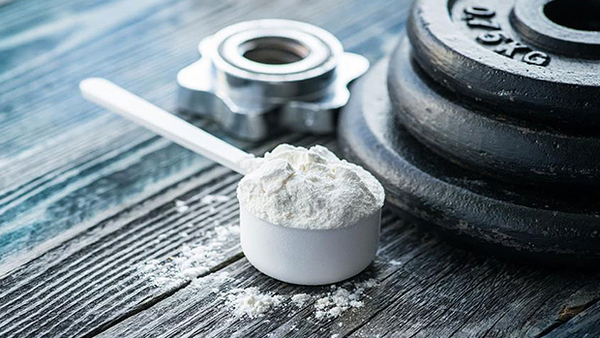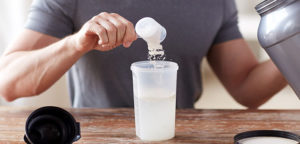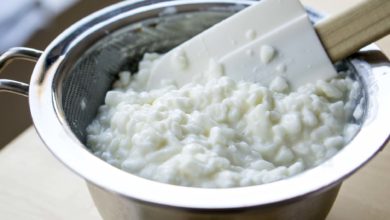Should I Take Creatine on OFF Days?

Creatine… hmm the go-to muscle-engorging, vascularity-enhancing supplement.
Who wouldn’t want to take creatine on their off days? Well… that’s not really the question.. the question is…
Should you be taking creatine on your off days, or should you give the stuff a rest?
Let’s flashback to the time you stepped inside the gym and you kept hearing guys praise creatine as if it’s their holy grail.
They said creatine is the go-to supplement for anyone wanting to improve their performance in the gym.
That it’s scientifically proven to increase strength and exercise performance while providing a number of other health benefits to anyone who takes it in moderation.
Everyone who’s on the Creatine train agrees that it helps in 3 main ways:
- It helps increase muscle mass;
- It boosts energy which is required for explosive exercises; and
- It helps hasten recovery after workouts.
Now hearing all of those would convince anyone to at least test it, right? So you tried it. And wow, you guess they were right. Now you’re taking it regularly and it’s done wonders for your gym time!
But now that we’ve gone past the “Should I use Creatine?” question, you’re wondering: Is it safe to take it on days when you don’t hit the gym? It’s a valid question. After all, if you don’t work out 7 days a week, then you sure have a few days in between for recovery, and you may have been wondering whether or not to take creatine on those days.
Well, read on to know the answer.
But just how often should you be taking creatine? Should you take creatine on your off days? Or should you only take creatine on the days that you are training? Or is it best to take it in cycles? Meaning cycle on for a specific amount of time and then cycle off. What about creatine for women, can girls take it?
Well let’s find out.
What is Creatine

Let’s review what we know for a bit.
Founded in 1932 and having significant studies dating back to the 1970s, creatine might be one of the most studied products when it comes to dietary supplements.
Due to this, it’s gone through plenty of research and testing to ensure it’s safe for consumption.
Creatine is a multipurpose organic compound that’s naturally found in your body after consuming protein. Protein is itself particularly crucial for muscle growth. It’s no wonder you will find it in most healthy meals for men and women alike that many a fitness buff swear by.
I often love to top up my protein intake with a glass of protein powders smoothie. But protein powder is quite expensive, so if it’s well out of your reach, I’d say consider using protein pills instead. I also get questions about whether it’s safe to drink protein shakes without working out, but that’s a topic for another day.
That aside…where were we? Well yeah, thing is, after protein consumption, your muscles convert creatine into creatine phosphate, then into adenosine triphosphate (ATP).
ATP is the chemical your body uses for peak performance during explosive exercises – the likes of smith machine deadlifts, power cleans and cleans, or say when doing 1 set to failure training.
When ingested, creatine helps in the manufacture of triphosphate in the body, which is a necessary catalyst in enhancing muscle contractions. As a result, you can train harder for longer.
The question of how it is used has been asked and answered in equal measure, and here is the best guideline for using Creatine. It is essential to note the supplement has a long history dating back to the 1970s and has maintained its relevance to date. Gymnasts’ wrestlers and other professional athletes are on record consuming the supplement, giving you confidence in using it.
Smart people found ways to make creatine without having to consume loads of protein and that’s how powdered, liquid, and pill creatine supplements came about today.
Powdered creatine is common among athletes, and many believe it is more effective than the rest. However, always consult your nutritionist before settling down on what works best for you.
Should I take Creatine on OFF Days?

Here is the million-dollar question that lingers in the mind of many creatine consumers.
Taking Creatine on OFF Days: Good or Bad?
Short answer: GOOD.
I take the stuff everyday. You can check out the stuff that I use on amazon by clicking here.
Long answer: Taking creatine every day is beneficial for you and your body, whether or not you work out. Creatine is a supplement and not a drug, there are a lot of creatine-free protein powders that you can use in your OFF days, if you use protein shakes or meal replacements.
Being a supplement, it helps fill nutritional gaps in your diet and generates energy that your body can tap into when it needs an extra boost, this might be a reason why people say creatine promotes weight gain which is a topic we discussed before.
So long as you take it in moderation, though. According to studies, a low daily maintenance dose of 3–5 grams is recommended during OFF days if you’re done with your loading phase to maximize the benefits of Creatine intake.
The simple answer to this is YES. Your body needs 20gm of Creatine to carry out its normal functions, making it okay to take creatine on off days, but not forever, and when doing so only take small amounts on your off days as recommended above (3-5 grams).
But the other part of this answer is that you need to cycle creatine on and off. Yes, take creatine on your off days, but only do so for 12 weeks or so. Then after the 12 weeks, do your body a favor and take a 3-4 weeks break. This is called cycling off.
Will Taking Creatine on OFF Days Help Me Build Muscle?

Science has proven that it does!
Creatine promotes increased endurance, and stamina during numerous repetitions of high-intensity training such as weight training by increasing the concentration of the nutrient in your muscles when you take it as a supplement.
Normally, the creatine you’ve used during training is replenished with the creatine supplement you take during workout days.
When you do take them on rest days, it helps to continuously replenish the creatine you’ve lost to guarantee you’re at your maximum by the next training day.
Reduction of muscle breakdown and retention of muscles during exercise can be had if you take creatine on your OFF days. To get the most optimal benefits from taking creatine, it’s vital to make sure your fuel tank, that is your muscles, is full when you train.
How Long Should I Take Creatine?
Debates about the length of creatine supplement intake and how to use creatine most effectively are still ongoing and are hot as ever.
On one hand, some people are claiming that the best way to reap the benefits of creatine is by following a cycle while on the other hand, others are saying that trying to creatine cycle is unnecessary.
Should I Take a Break from Creatine? Should I Cycle ON & OFF or Stay on Creatine All Year Round?
First, we hear out the CREATINE CYCLE ON CYCLE OFF Camp.
The Cycle camp argues that long-term creatine use tends to be unsafe and pending further research, their recommended approach is to avoid long-term, continuous creatine use and stick to creatine cycling.
To them, it’s much safer and sensible to use creatine only when it’s needed, such as during competition or build-up phases.
Athletes have claimed that alternating periods of use and non-use of creatine worked well for their performance and muscle building, and they find this approach much safer than taking creatine supplements every day including training-free days.
While there’s no strict rule on creatine cycling, the most common strategy that many abide by is to use a five-week guide on using creatine: one week of charging or loading and followed by four weeks of maintenance.
After those five weeks, a washout period of at least a month is recommended where no creatine should be taken.
Now, let’s hear from the Long-Term Creatine Use Camp:
This camp recommends taking creatine supplements continuously with a daily dose of between 3 and 5 grams.
Unbroken creatine intake, both during your ON and OFF days, not only promotes increased performance but also helps in muscle-building.
Positive effects on the body during intake have been thoroughly proven by research and are safe when the recommended daily dose is regularly taken.
Studies have proven long-term use of creatine does not increase the risk of negative side effects such as muscle cramps. In one study that lasted three years, it showed that an intake of 5 grams of creatine a day had no ill effect on injury or cramping in their subject athletes.
In another study that focused on athletes who took creatine for four years, the researchers found no difference in muscle cramping or injuries compared with other athletes who did not take creatine.
Simply put, this camp claims that there are no known adverse health effects of long-term creatine supplementation.
How Long Do I Take Creatine?
Usually, around the 12-week mark, I’ll take a break and cycle off, as I notice that my body needs a break. Cycling off the creatine lets your body take a rest and tells your body to start producing its own levels of creatine again.
Should I Time My Creatine Intake?

Timing when to take any nutritional product has confused people for years on end. Besides, you could have read on some bro science forum or somewhere else from some wanna-be guru that there are some magical times when you should take certain supplements to draw optimum benefits.
This is not the case with creatine. Creatine is not something that needs to be timed, as it is something that builds up slowly in the muscles. It’s not like a pre-workout where you need to time it so that it hits right as you walk into the gym.
Don’t get me wrong here, pre-workouts work great as far as giving you the pumps once you hit the deck for your workout. These come in many forms; I prefer those pre-workouts without beta-alanine to avoid all the itching and flushing.
What’s essential is to figure out when considering using them is how long your pre-workout supplement lasts as some wear off faster while others last longer.
The most important thing about timing creatine is just to stay consistent when you are taking the stuff. Do not miss a day and try and make up for it the next day. Just stay on track, whether in your loading phase or just taking the same amount every day, which is what I do, for a specific amount of time.
Just be consistent.
Do you need Carbs While Taking Your Creatine?
Research gives us a mix of the good, the bad, and the ugly. One study provides this recommendation while another research recommends the direct opposite of the other. A group of researchers and athletes found out that taking Creatine with carbs led to better performance compared to those who just took Creatine.
Taking a workout shake with your Creatine is thus a good practice that you shouldn’t ignore. You always stand to get some added benefits when you add in your carbs mixture to give your body some added benefits.
I typically just use my low-sodium protein powder and make a protein smoothie for my mornings to go along with my creatine.
But most importantly, work with what works best for you, make your carb shake at home, and work with it routinely.
Is Caffeine Intake Recommended When Taking Creatine?
In a 1996 study, caffeine was found to cancel out the benefits gained by taking creatine supplements. However, other studies have found caffeine to be less harmful. Thus feel free to take caffeine in small quantities to stay safe, especially if you are taking caffeine anhydrous, which can be quite concentrated.
Is it Safe to take Creatine with Juice?

Many people have argued that the acid in juice breaks down Creatine, thereby lowering its potency. However, scientists have researched the matter and have concluded taking Creatine with your favorite juice such as orange juice or any other juice, does not affect its strength.
If Creatine lost its potency upon mixing with an acidic juice, then it would be useless taking it orally as the stomach is highly acidic. Thus, feel free to make your Creatine with a juice of your choice.
Is Creatine Recommended For Young People?
I get many questions on this matter from mothers who have their teens actively involved in sports. It is a genuine concern on the effect of creatine supplements on young people.
Research has found no negative impact of persons above the age of 12 taking Creatine. Many doctors recommend taking Creatine to young patients with neuromuscular disorders. Thus, if you are a concerned parent or mother on this issue, do not get stressed, as the supplement is safe for both the young and the elderly.
However, for young people, it is recommended you wait until you get to puberty before you start taking the supplement and stick to the dosage. Also if you have a sensitive stomach some supplements might be better that others for you.
Related Reading; How Long Does it Take to Tan? Natural Tanning Vs Tanning Bed
My Last Thoughts on Taking Creatine on Your OFF Days
At the end of the day, creatine supplements are considered expedient and safe to use. If you regularly weight train and are looking to add muscle, creatine supplements may provide faster results while improving gym performance.
Taking Creatine on off days is proven to increase muscle mass and strength, improve your performance and reduce the risk of most, if not all, sport-related injuries out there.
Whichever route you take, whether you’ll continuously use creatine on your off days or follow the creatine cycle, is all up to your preference and comfort.
Recommended Readings:
- Stopped Working Out For a Year: Here Is What Happened
- Motivational Water Bottles
- Should You Squat Every Workout?
- Best Kachava Protein Powder Alternatives – Cheaper, Tastier, & Better Substitutes
- Best Meal Replacement for Breakfast – Top Tasting Morning Shakes
- Stopped Working Out for 6 Months – What Happens to Your Body During a Workout Break?
Ben Mayz
Hi there! I'm Ben, main author and chief editor at Fitlifefanatics.com. I have been obsessed with Strength Training and Fitness for 18 years now.
My passion for living a happy fit lifestyle is what made me realize that fitness is what I wanted for my future.
I went on to earn my Masters in Sports Training & Biomechanics.
My passion for Strength training & fitness and my love of helping others is what made me start Fitlifefanatics.
Here, myself, and a team of specialist aim to provide the most accurate, and actionable information possible in hopes to help foster the fitness community forward.
You can learn more about Fitlifefanatics on our About Page










